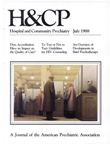Counseling for HIV Testing
Abstract
Recommendations are presented for counseling individuals who wish to know if they have been infected by the human immunodeficiency virus (HIV). Pretest counseling includes explaining the sensitivity and meaning of HIV antibody tests and the limits of confidentiality, assessing the patient's potential strengths, vulnerabilities, coping capacity, and supportive resources, and mutually deciding if the test is advisable. Populations that have been identified as at risk for HIV infection are listed, and four case vignettes that illustrate the complexity of the decision to be tested are provided. Posttest counseling includes notification of test results, reducing the immediate distress of seropositive patients, educating about how HIV is and is not spread, explaining methods to prevent transmission, advising the patient about who should be told the test results, and arranging follow-up care.
Access content
To read the fulltext, please use one of the options below to sign in or purchase access.- Personal login
- Institutional Login
- Sign in via OpenAthens
- Register for access
-
Please login/register if you wish to pair your device and check access availability.
Not a subscriber?
PsychiatryOnline subscription options offer access to the DSM-5 library, books, journals, CME, and patient resources. This all-in-one virtual library provides psychiatrists and mental health professionals with key resources for diagnosis, treatment, research, and professional development.
Need more help? PsychiatryOnline Customer Service may be reached by emailing [email protected] or by calling 800-368-5777 (in the U.S.) or 703-907-7322 (outside the U.S.).



